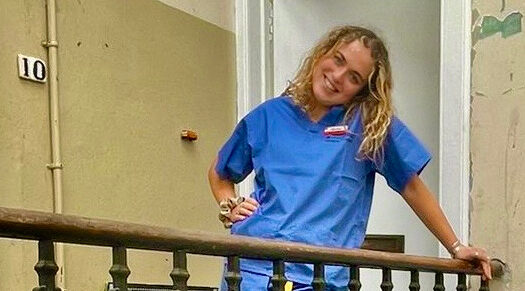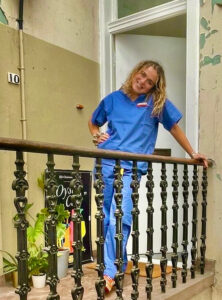How caption editing made me fall in love with Ophthalmology (and why I now want to do the Master’s I’ve been captioning for)

A guest blog p ost from one of our human-captioners, Ellie Kerr. Ellie joined us back in 2023 and is one of our original captioners – when we only had a team of 2. Now we have 20 part-time captioners who work on correcting automated captions across our lecture recordings and other media.
ost from one of our human-captioners, Ellie Kerr. Ellie joined us back in 2023 and is one of our original captioners – when we only had a team of 2. Now we have 20 part-time captioners who work on correcting automated captions across our lecture recordings and other media.
I never thought a part-time uni job would change my career path—but here we are.
When I tell people I work as a caption editor alongside med school, they usually picture me furiously typing during live lectures. In reality, it’s a bit more behind-the-scenes: I clean up automated captions, check for accuracy, and make sure the final transcript makes sense to actual humans—not just the software. Basically, I battle rogue punctuation, mangled medical terms, and the occasional hilarious AI mishap.
It’s flexible, remote, and fits perfectly around my slightly chaotic schedule of placements, study blocks, and the occasional well-earned nap. But the unexpected bonus? It’s helped me discover a genuine passion—and pointed me toward a future I hadn’t considered before.
A huge chunk of the captions I edit are for a Master’s course in ophthalmology. At first, I was just focused on getting through the edits and making sure the software hadn’t turned “optic disc” into “optics desk”. But week after week, I found myself drawn in. As I combed through the content, something clicked—I realised I wasn’t just fixing sentences. I was learning. Properly learning.
And not just the basics. I was eavesdropping on in-depth discussions about eye disease, global blindness prevention, laser surgery, and retina tech that sounds like it’s been lifted from a sci-fi script. I started recognising overlaps with my own med school curriculum—but here, the topics were richer, deeper, and more forward-looking. It felt like a sneak peek into the kind of doctor I could become.
The editing work itself is surprisingly satisfying. There’s something meditative about turning jumbled AI-generated text into clean, natural speech. It’s like solving a mini puzzle where the prize is clarity—and accessibility. Knowing that I’m helping make postgraduate education more inclusive, for a variety of students, makes it all the more rewarding.
And after months of working with this material, I don’t just want to edit these lectures—I want to join them. I’m hoping to apply for the very ophthalmology Master’s I’ve been supporting from the sidelines. I already know how engaging the content is, how inspiring the lecturers are, and how deeply it connects to both clinical practice and global health challenges.
One of the best parts of the job, though? The people. I work alongside other students who are all juggling their own degrees, placements, and general life chaos. There’s this quiet camaraderie in knowing we’re all in it together. And while most of our work is remote, the occasional in-person shifts are a proper treat. The office has this dreamy view of Edinburgh Castle (straight out of a postcard), there’s always tea on the go, and our lovely boss Nelly always brings Tunnock’s Tea Cakes—an elite-tier snack if there ever was one.




What a lovely read, I hope Ellie is successful in pursuing their ophthalmology masters.
… and a big shout out to Stewart for his efforts on behalf of Ophthalmology back in the day as he was instrumental in smoothing our way in terms of learning technology advice and guidance back when our Ophthalmology programmes were being designed and developed.
What an amazing compliment to our Ophthalmology Programme Team, Ellie! We’d like to thank you for the great work you have been doing to caption our video lectures. Lovely to hear that you enjoyed learning about the speciality as you went along from our global network of ophthalmologists, medics, optometrists and ophthalmic allied health professionals. Wishing you good luck in your career and perhaps we’ll see you on our MSc programme at some point….
All the best
Dr Heather Ellis, BA, MA(Hons), PhD, SFHEA
Senior Lecturer
Academic Cohort Lead (Ophthalmology)
Deputy Programme Director for the online Ophthalmology Masters Degrees:
MSc/PG Dip/PG Cert in Primary Care Ophthalmology
ChM (Master of Surgery) in Clinical Ophthalmology
The University of Edinburgh
Edinburgh Medical School, Deanery of Clinical Sciences, Edinburgh Surgery Online